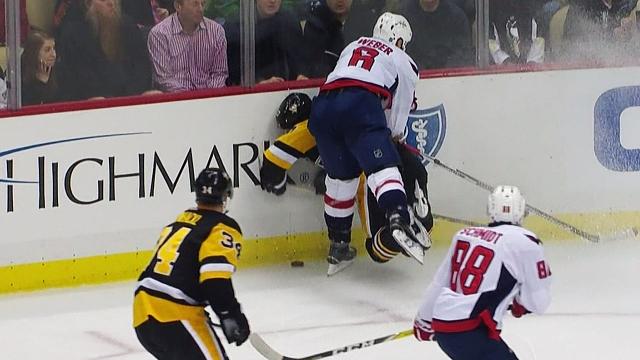By:
Filed under: News, NHL, Pittsburgh Penguins, Suspensions,Washington Capitals

Many will react to the news that Mike Weber of the Washington Capitals did not receive supplementary discipline for boarding Bryan Rust of the Pittsburgh Penguins over the weekend with the same incredulity Hall of Fame coach Roger Neilson did so many years ago. “There are two things you don’t want to know in life,” Neilson once said. “What goes into hot dogs and what goes on in the NHL’s New York office.”
You watch the replay of Weber’s hit on Rust and it seems outrageous that there was nothing beyond the boarding major and misconduct that Weber received, which removed him from a game that was already decided with just 11:21 remaining. No hearing, no fine, no suspension. Nada.
In the absence of an explanation from the NHL’s department of player safety, we can only assume that those who examined the hit came to the conclusion that Rust bore the responsibility for it by placing himself in a vulnerable position. And Rule 41, which governs boarding, clearly backs them up. “There is an enormous amount of judgment involved in the application of this rule by the Referees,” Rule 41.1 reads. “The onus is on the player applying the check to ensure his opponent is not in a defenseless position and if so, he must avoid or minimize contact. However, in determining whether such contact could have been avoided, the circumstances of the check, including whether the opponent put himself in a vulnerable position immediately prior to or simultaneously with the check or whether the check was unavoidable can be considered. This balance must be considered by the Referees when applying this rule.”
Fair enough. If you accept the premise that Rust put himself in a vulnerable position “prior to or simultaneously with the check,” – and your trusty correspondent does not – then you should also accept the premise that, in the eyes of the NHL, Weber actually did nothing wrong. So if that’s the case, why was Weber’s boarding major and misconduct not rescinded by the league?
The people who handle these things for the NHL often talk of an incident, “rising to the level of supplementary discipline.” This is their way of saying they’re fine with the penalty on the ice, basically implying that time served is a harsh enough sentence for the offense. The fact that Rust was not hurt and returned to the game, and in fact had an assist on the Penguins sixth goal in a 6-2 rout, likely had something to do with that. But more likely was the fact that Rust was quoted after the game as saying, “I had a chance to really think about it. Maybe I turned at the wrong time and that was just bad timing.”
But what these rulings do, and what the NHL doesn’t seem to grasp here, is that these rulings provide fertile breeding ground for potentially far more serious and damaging incidents to occur. It’s true that Rust skated away unscathed and returned after a round of concussion protocol. But we all know how potentially dangerous these head-first-into-the-boards hits can be. By not suspending Weber or not rescinding his major, the league is essentially giving the players all kinds of mixed messages.
The first is to those taking a hit. That message is that if you’re chasing a puck in the corner and you want to get an opponent out of the game, it’s actually OK to turn at the last second because you’ll succeed in getting the player kicked out. And it’s telling those who make the hits that, when it comes down to it, the player being hit actually has a far more important onus on himself and that, while you might get a major and a game misconduct, you actually won’t be treated very harshly.
And so what is that going to do? Well, it’s going to encourage players to continue to turn their backs at the last second and hitters to drill them from behind on the numbers. And hey, what could possibly go wrong with that kind of thinking?
My view of the hit is that Weber had all sorts of time to realize what could potentially happen as the play unfolded and that Rust, despite his mea culpa, had no other option than to stop up and play the puck in a vulnerable position. I thought he deserved to be suspended.
But that’s beside the point. What matters here is what the NHL’s department of player safety thought and the message it’s sending. And that’s where the hot dog analogy Roger Neilson made decades ago still seems to apply today. The league’s failure to make a bold ruling one way or the other is going to lead to disastrous results one day.


No comments:
Post a Comment